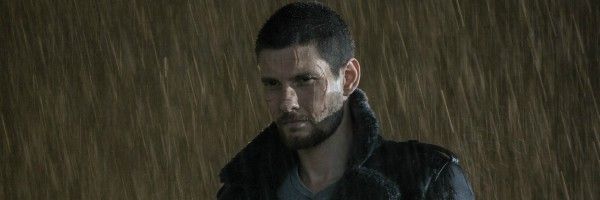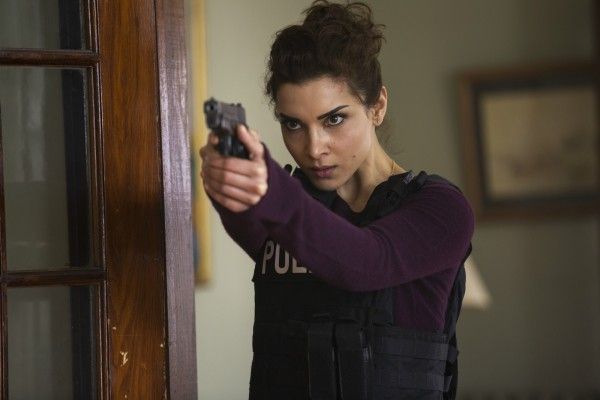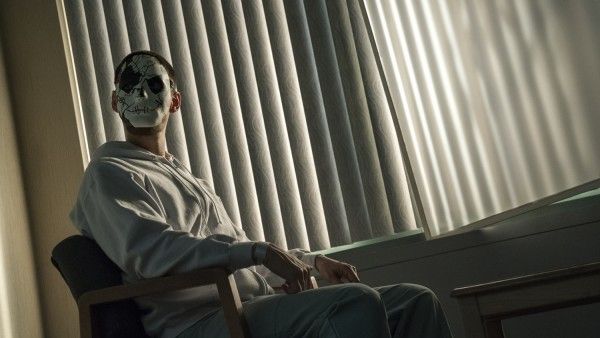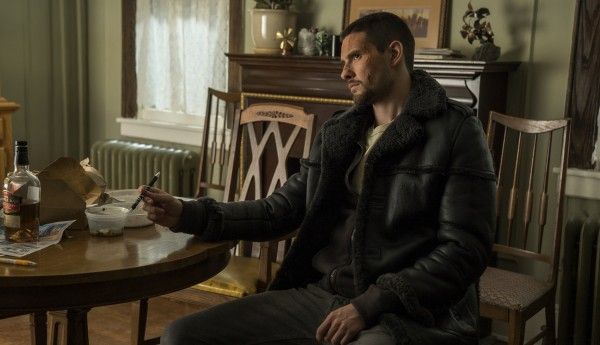After the events of Season 1, former Marine turned vigilante Frank Castle (Jon Bernthal), also known as The Punisher, has been keeping to himself and living a quiet life on the road. When he finds himself a witness to the attempted murder of a teenage girl (Giorgia Whigham), stepping in sends him down a path that puts a target directly on him, forcing him to uncover the dangerous mystery that she’s caught up in while also facing an old enemy that could destroy him.
At a press day to promote the second season of the Netflix series The Punisher, Collider got the opportunity to chat with co-stars Ben Barnes (who plays the mentally and physically broken Billy Russo) and Amber Rose Revah (who plays out for revenge Homeland Agent Dinah Madani) about how Season 1 affected Season 2, the conflict between their characters, learning how to re-assimilate in a world where you’re unsure of your place in it, acting with a mask that covers your face, favorite fight scenes, and what it means to be a part of the legacy of Stan Lee.
Collider: After having done a season, did Season 2 feel different, now that you had a better sense of what you were doing and who these characters are?
AMBER ROSE REVAH: For myself, I definitely did. With the first season, when you’re reading it, you get an understanding of the script and the stories, but you don’t get an understanding of the tone or how it’s gonna look, visually. When we film, we don’t watch any of the playback, so we don’t see what it’s gonna look like, with all of the lighting and how much that affects it. And so, when I saw Season 1, a big part of it was how dark the whole show is, and how that mirrors the stories and characters in the show. So, going into the second season, that was something I had in my mind. With Dinah, a big part of her story this season is that she’s still fixated on Billy Russo and her revenge, so it was great ‘cause I could use that.
BEN BARNES: You have those relationships of trust that have been built up by doing scenes of intimacy, and that can bleed over into doing scenes of conflict. I feel more comfortable trying to terrify or torture Amber because we’ve done those love scenes together. That bleeds over. I obviously had to build that trust with Floriana [Lima], who plays Krista, and we did that very quickly because we started doing that therapy. I felt very safe in my mask, and it was like a fresh start for me. I’d had the narcissist and hair gel knocked out of me by Jon [Bernthal], at the end of the first season, so I felt like I was almost starting a new show, to be honest, because of the fractured nature of Billy, at the beginning of the second season.
Ben, what was it like to spend a season building up this character, only to strip it all away for Season 2?
BARNES: What’s interesting for me was that it was actually one of my pitches, when we were doing the carousel scene, to be like, “What if it’s his brain that’s the mess, and not his face, really?” I left them to design the face themselves, but I wanted to see what would happen if it was his brain that was the puzzle pieces and it’s like Memento. Otherwise, it’s just mustache twirling and growling back at Jon. I thought it would be so much more interesting if I was just this emotionally completely volatile guy who doesn’t have control of his memory or his emotion. It was take two. But then, the question that posed for me was, do you inevitably and necessarily always end up back where you started ‘cause of how you were raised and who you really are, at your core? If you’re this hubristic, narcissistic egomaniac at your core, will you always revert to that behavior, no matter what you remember and no matter who you interact with, or is there hope for redemption, even for someone like him? That was a question that I made sure I asked myself, every scene that I looked at. I would write it on the front of all the scripts to be like, “Make sure you’re doing that.” That’s what was most interesting about this to me.
REVAH: And that theme runs through the whole show. With most of the characters, there’s a question of identity with, who are we to the outside world, and who do we see ourselves as?
Amber, this season, Dinah Madani keeps having to talk her way out of being in trouble.
REVAH: Yeah, exactly. It was great. I took from personal experience. It’s the story of my life. Yeah, she does, and she keeps going back and forth with what The Punisher is doing because he’s still killing people and she tries to justify it to herself a lot of the time. But then she sees connections, as she did with Billy Russo and probably still does, deep down inside, from the pain that they have suffered, in different ways.
Ben, do you think things would have worked out differently for Billy Russo if he’d had a therapist who thought about what was truly best for him?
BARNES: Having been abandoned by his mom, and that drug addict situation with his mom, and the abuse he suffered in the boy’s home absolutely set him off, down the wrong path. And then, he found a bit of family in Frank and in the Marines, but it was a bit late for him, at that point. I think he really falls for Krista, personally. I tried to make him more honest, as the season progressed, in Season 2, moving towards a potentially redemptive moment or not. I think it’s less about the therapy, and more about recognition in each other and each other’s psychological scarring, and really seeing that you’re not alone, in the way that you are approaching the world. That’s what the whole series is about. All of these characters interconnect in these gray areas, having suffered and just trying to fit back into society. The second season for Frank, as well, is about trying to re-assimilate. How does a man like that fit into the real world? All of the characters can ask themselves that question, in the second season. That’s what makes it interesting for me.
What was it like to work with the mask? Did you have to figure out how to best make that work?
BARNES: Yeah, we adjusted it quite a few times, actually. It originally didn’t have nose holes, so I couldn’t really breathe. And the mouth hole was a bit small, so I was just collecting spit in it. We had to make the eye holes bigger. You have to test out that kind of stuff. In the end, I didn’t ADR anything with the mask. It’s all live dialogue, expect for maybe two lines, in the entire thing, which is a testament to the sound department. I found it very freeing. Honestly, as soon as I tried the mask on and we went back to the make-up room, I was like, “We have to shave my head. It has to be institutional. It has to be a blank slate. He has to be someone who’s unaware of how he’s coming across. He needs to just be free to be because then, I can be more frenetic and spontaneous and unpredictable.” I actually felt very safe behind that mask ‘cause, when you’re an actor, a part of your job is to think about how you’re coming across. Is the costume right? Is the hair right? Is this expression getting across what I want it to? As soon as you’re thinking that, in the middle of a scene, you’re done for. That work has gotta be done before. But what the mask did was allow me to throw that all away, and just react on a guttural level. If I wanted to stand up and throw the chair, no one was gonna judge me. If I wanted to cry behind the mask, maybe people wouldn’t even know that I was. So, I found it really freeing. After those first couple of episodes where I’m in the mask, it set me up, when I took it off, to feel reborn.
REVAH: And it’s interesting to act opposite ‘cause you’re acting opposite a mask. We normally read so much in someone’s face. It’s all about movement.
BARNES: It’s disconcerting, isn’t it?
REVAH: It is. And it’s terrifying. Ben did a brilliant job with it. In person, you could really feel that behind the mask. You can’t see his facial reactions, but you feel scared in the room. There was a noticeable tension in the room.
BARNES: I felt weirdly more powerful, especially in the scenes with [Amber], near the beginning. We’d established a dynamic where we were reading each other, lying to each other, deceiving each other, and manipulating each other. In those opening scenes, I was like, “You can’t read me,” but I could read her. It was a powerful thing.
So much is going on this season, and there are a lot of really awesome fights. Did you have a favorite scene or moment to shoot?
REVAH: For me, I have two big fights in this season, and they were probably my favorite things. I really enjoyed doing them. I shouldn’t say enjoyed because it was tough work and it was very intense. It was a challenge, but I loved the challenge. The fight scenes with Floriana and with Ben were two very different scenes to do, but I’m hoping that they paid off, in the way that we gave our all for them, physically and emotionally.
BARNES: I spent a lot of time in the hospital room and a lot of time in the set for Krista’s apartment. Me and Floriana spent a lot of time in there, developing that relationship. The scenes that were in that house, they really just let me have free reign, in terms of curling up in a ball or smashing stuff, or whatever it was. What I really liked was when fragility was able to be the result of anger, or fury turned into tenderness. I just found those gray areas really, really interesting to play with and express, regardless of what it says on the page, in terms of dialogue, just being allowed to express whatever I was feeling, in that moment. You don’t often get that, as an actor. You can feel quite hemmed in and directed and shepherded, and I didn’t feel that, this season of this show, which was a really lovely feeling. And obviously, with my character, we strayed more from what’s in the comics than with other characters, but I think that’s what keeps it alive, on some level.
REVAH: I don’t have that problem ‘cause Madani is not in the comics. Although, I think they should make one for her.
BARNES: Someone probably has.
REVAH: What would her superpower be, though? I don’t know. I feel like she’s a shape-shifter. She could turn into a cuddly cat and just lures people in.
BARNES: And then, she could turn into a cool raven, and then a panther, and be like a werewolf, but for all the animals. That’d be cool.
REVAH: We own the copyright of that.
With this season dedicated to the memory of Stan Lee and now that he’s no longer with us, what does it mean to you guys to be a part of that legacy?
REVAH: It’s such a privilege.
BARNES: Yeah, I was very sad, not to ever get to meet him, actually.
REVAH: Yeah, likewise.
BARNES: I remember seeing pictures of him and Jon together and thinking, “Aw, man, one day,” and then, one day is too late.
REVAH: My younger sister is an enormous Marvel fan, and has been since she was so young. She’s got all of the Marvel paraphernalia. It’s nice to be a part of that, seeing what it does for young people, with the idea of these flawed characters.
BARNES: What I love about Marvel is that it’s also run by people who love this stuff. Joe Quesada, who’s one of the Marvel producers, is a brilliant comic book artist himself, and that’s how he rose through the ranks. We had a producer on our first season that was an ex-Marine, and that’s how he rose through these ranks. It’s not just people who want to be film producers or TV producers. It’s people who come from different walks of life. And particularly, when you’re in the hands of someone who’s a brilliant comic book artist themselves, they’re in the best position to share what they think. Someone from Marvel said to me, “Hey, you know, Daredevil Season 3 and The Punisher Season 2 are my favorite shows that we’ve made.” I can’t remember who said that, but it’s lovely when it’s coming from someone who’s so committed to it.
REVAH: And so passionate. And you really want to please the fans. I think the fact that everyone comes from those backgrounds means that everyone works to do it.
BARNES: And I’m so keen to give answers that will satisfy the most fervent comic book critics, in terms of not playing the character how it is in the comics. I’m keen to give them the justification that they need to really just be able to sit back and enjoy this version of it. That’s who I’m thinking about when I’m talking to you. People sometimes forget that we are really doing it for those people, who are gonna watch it and hopefully really feel like they used their Friday night, in the best way they could have, by watching it and committing to it and being challenged by it a bit, hopefully.
The Punisher Season 2 is available to stream at Netflix on January 18th.





